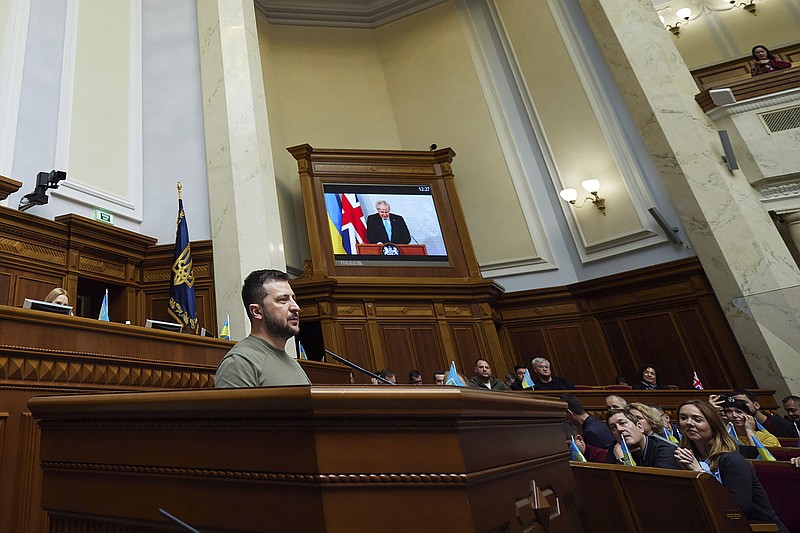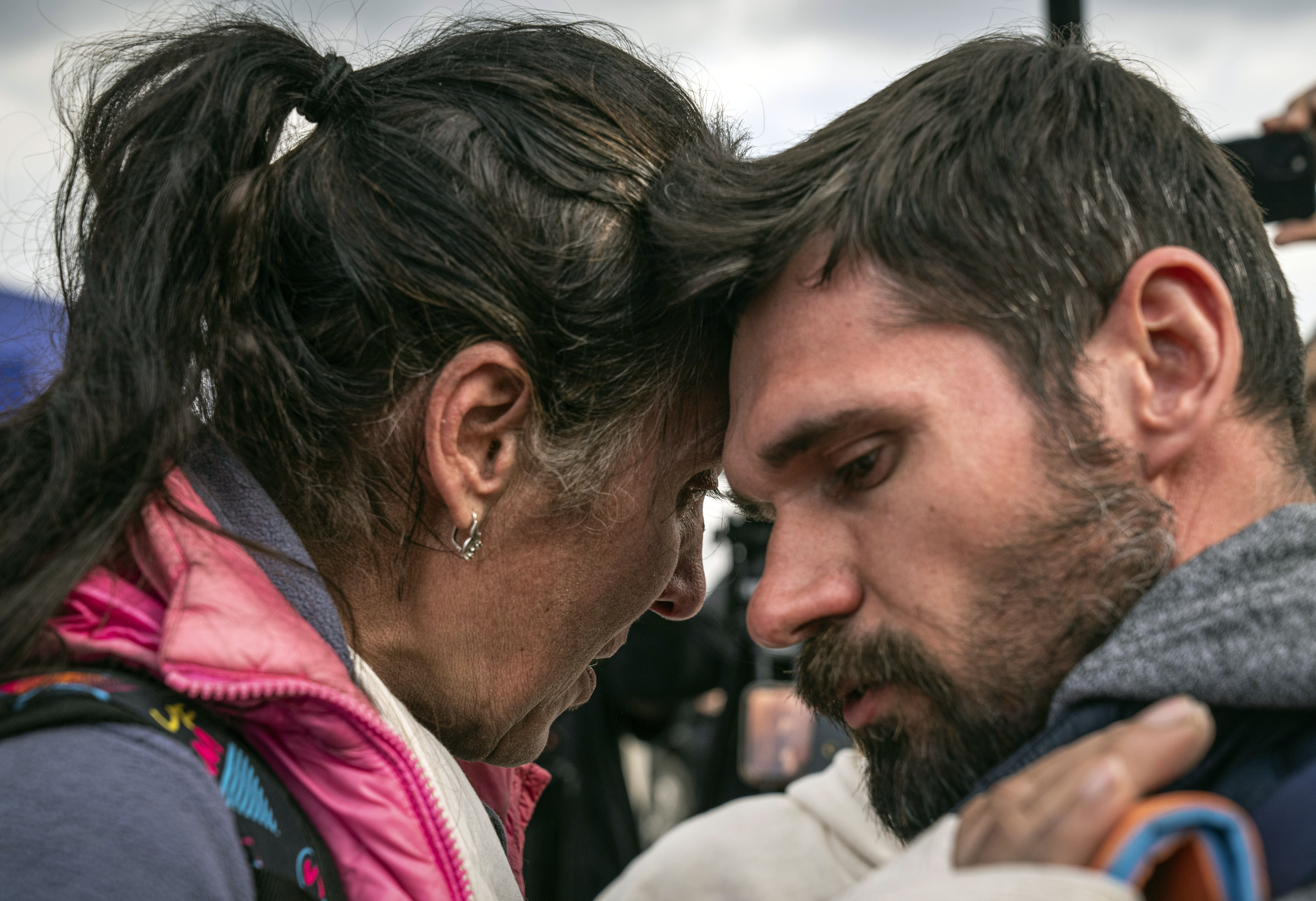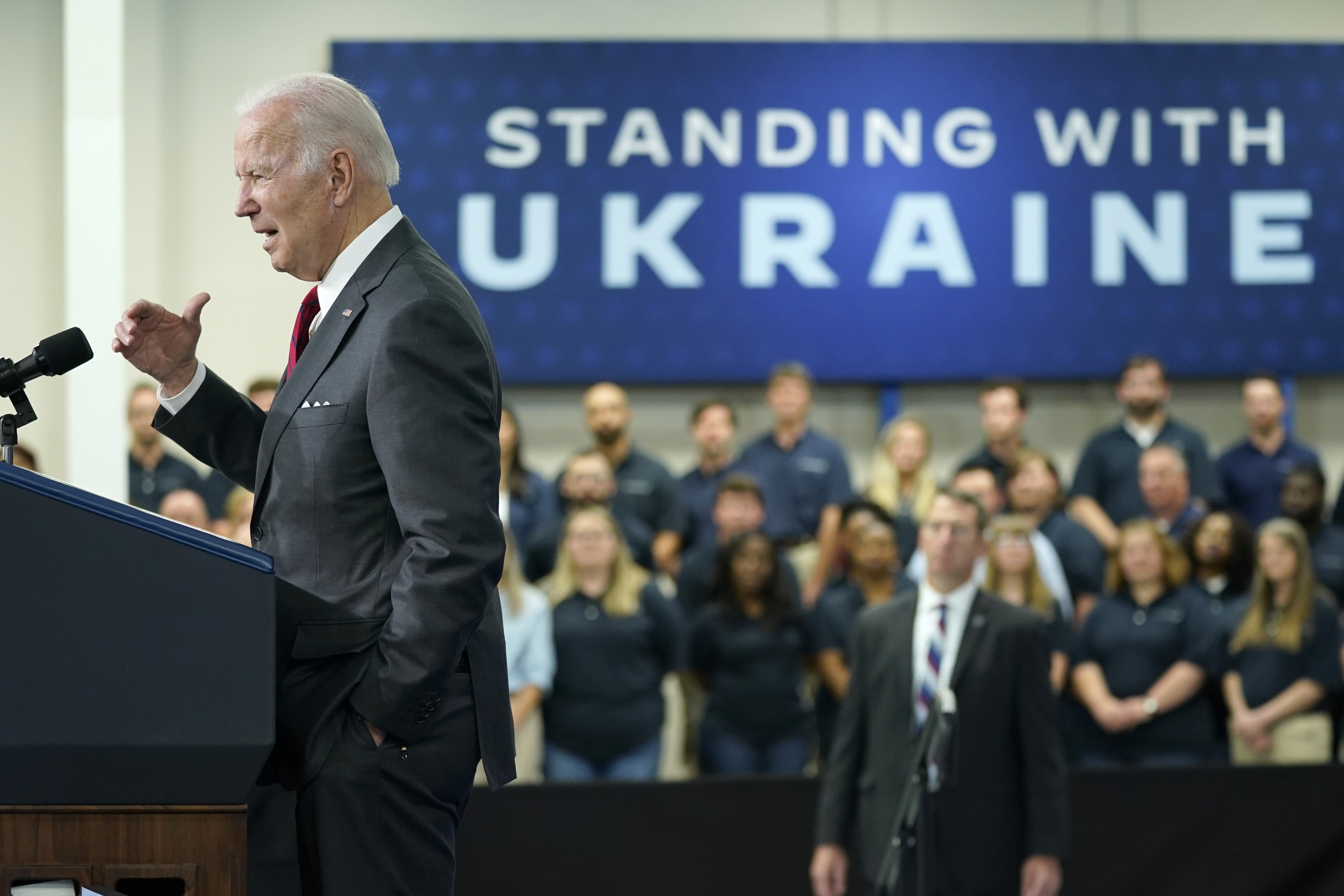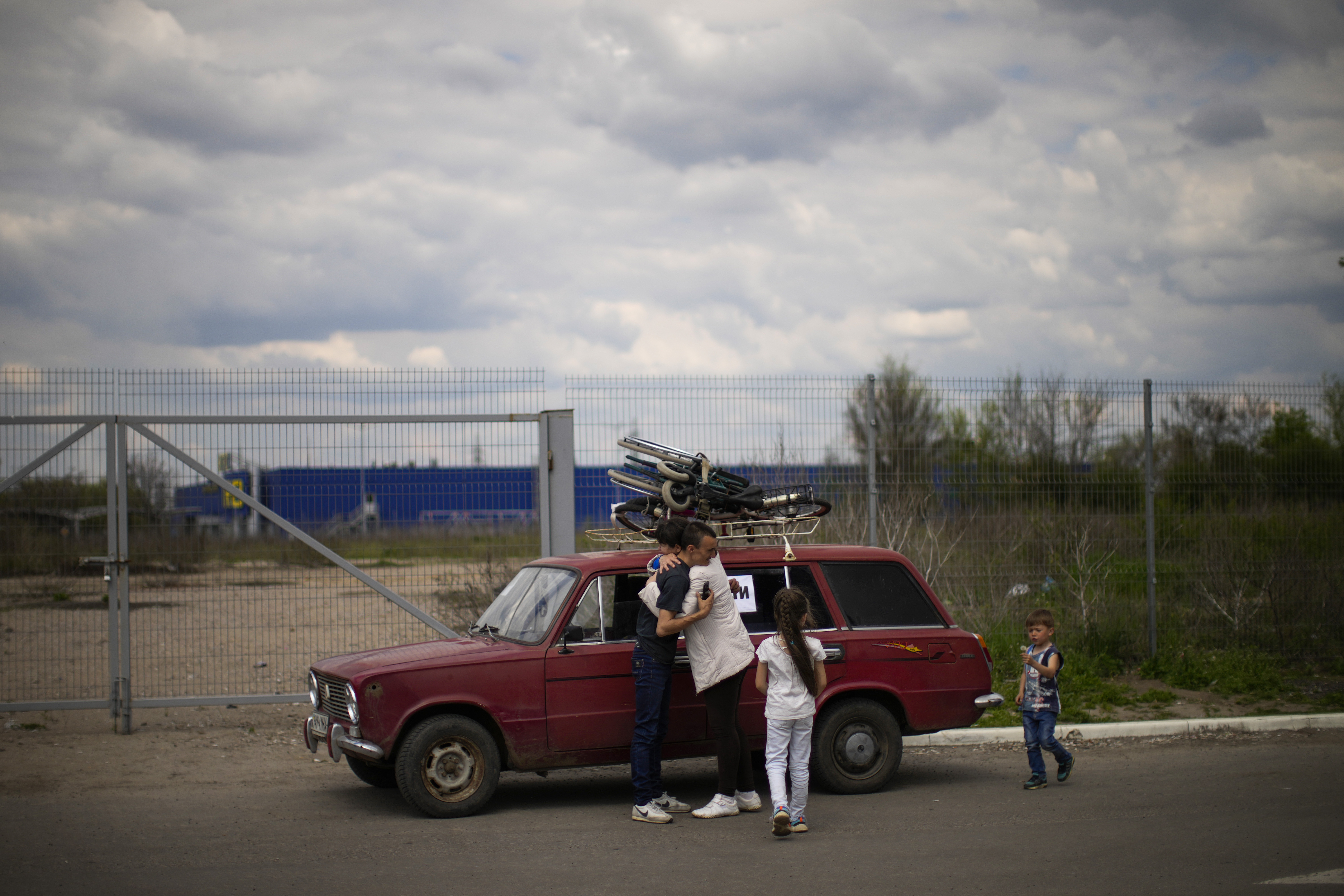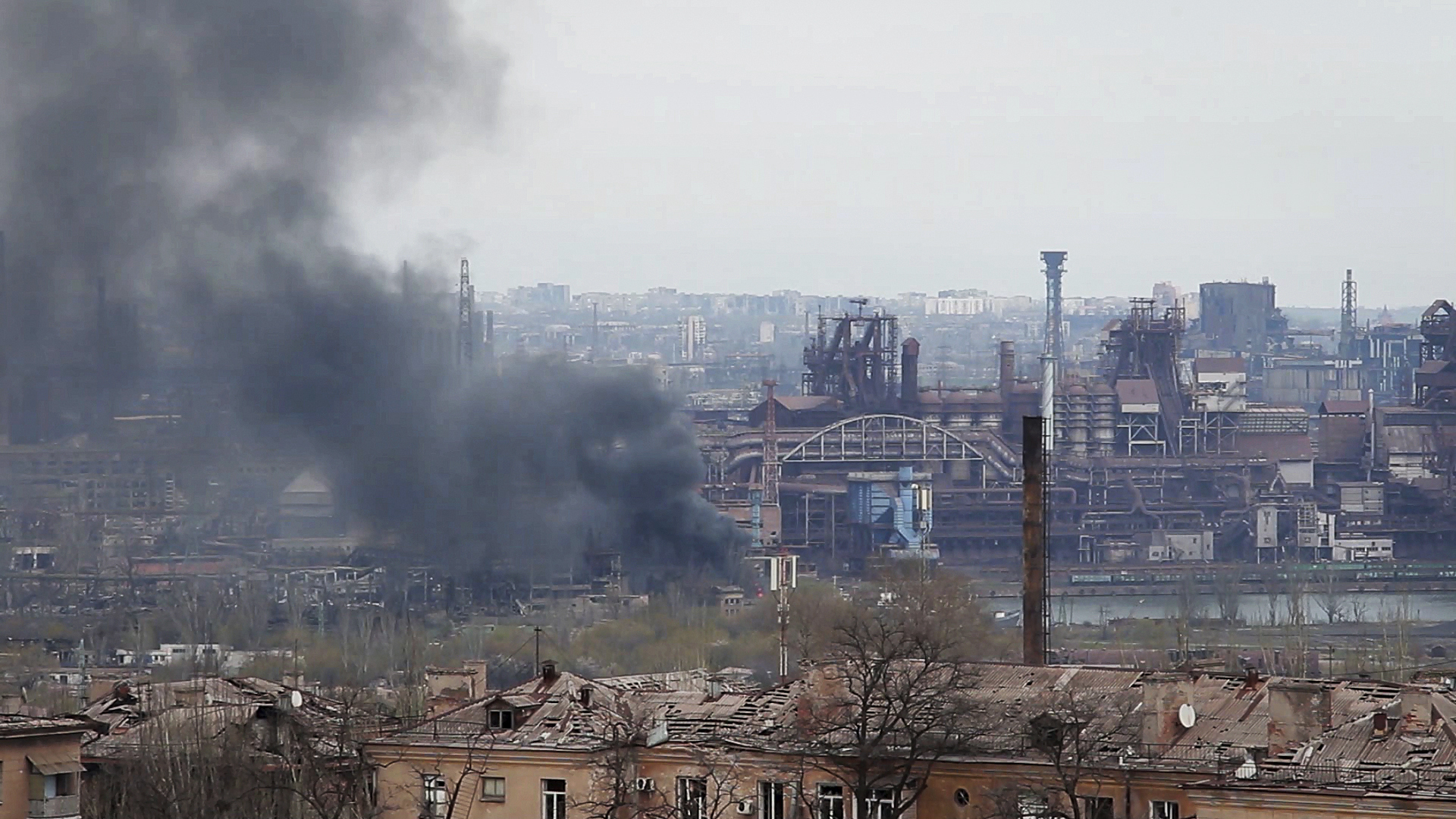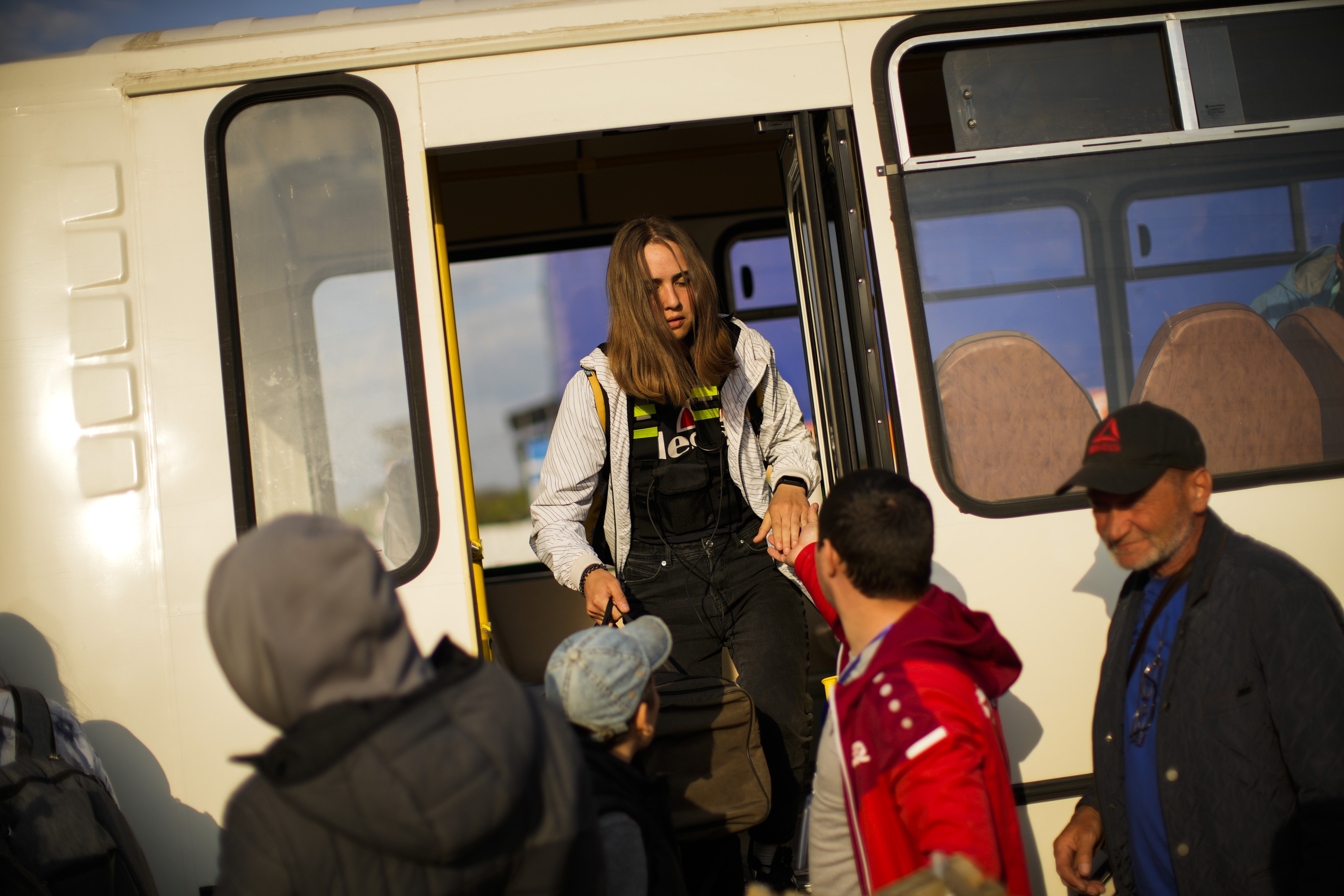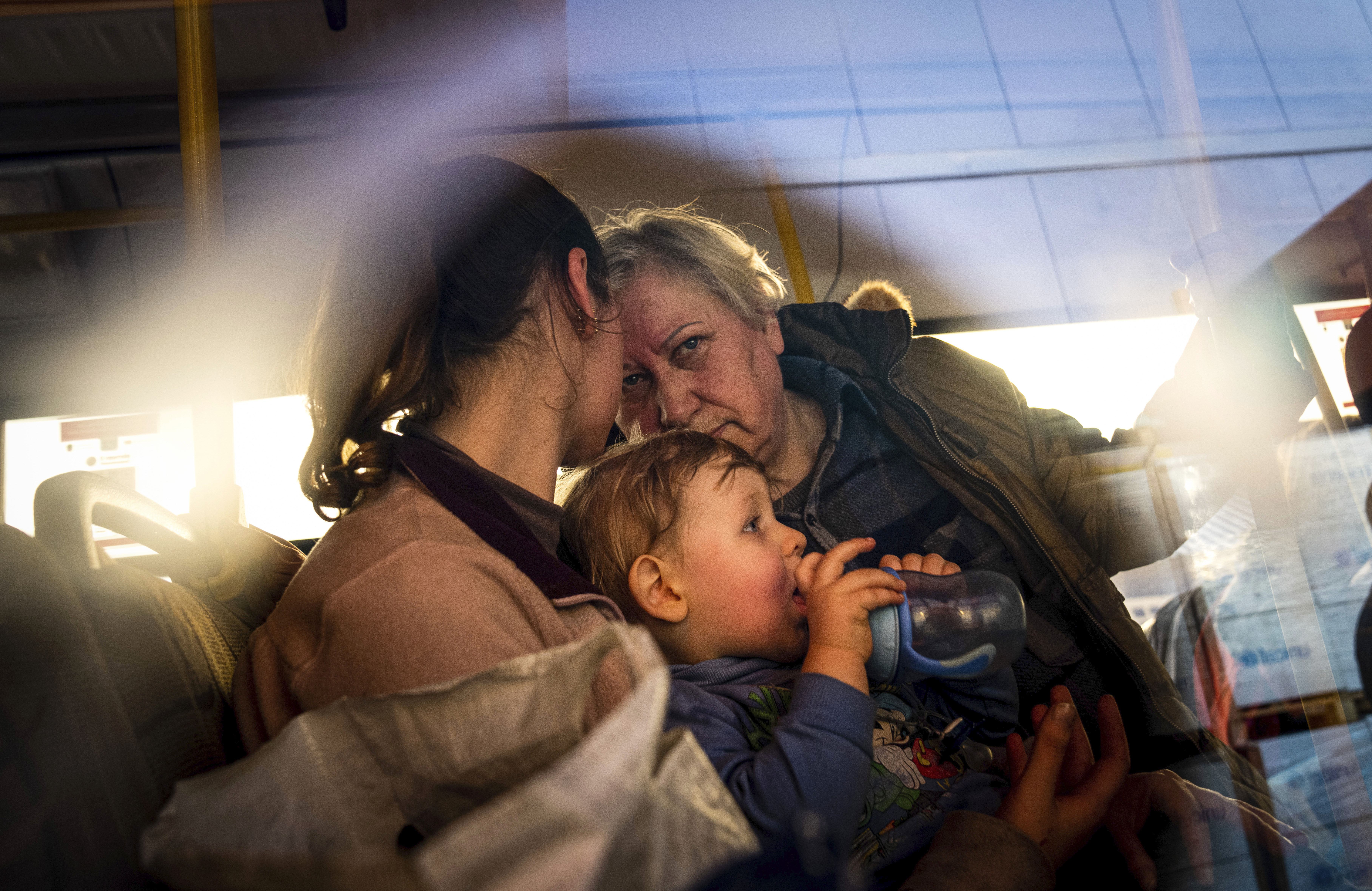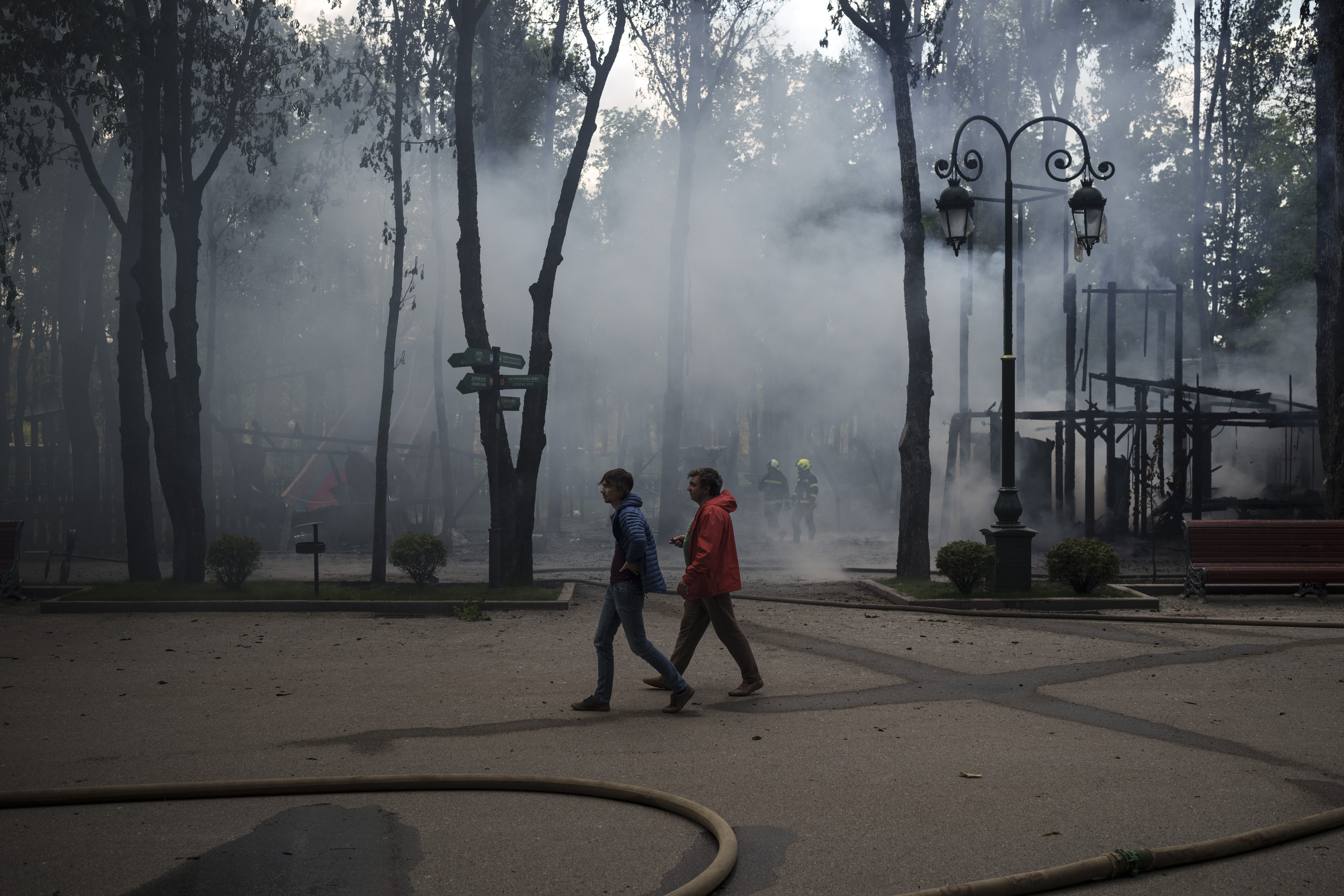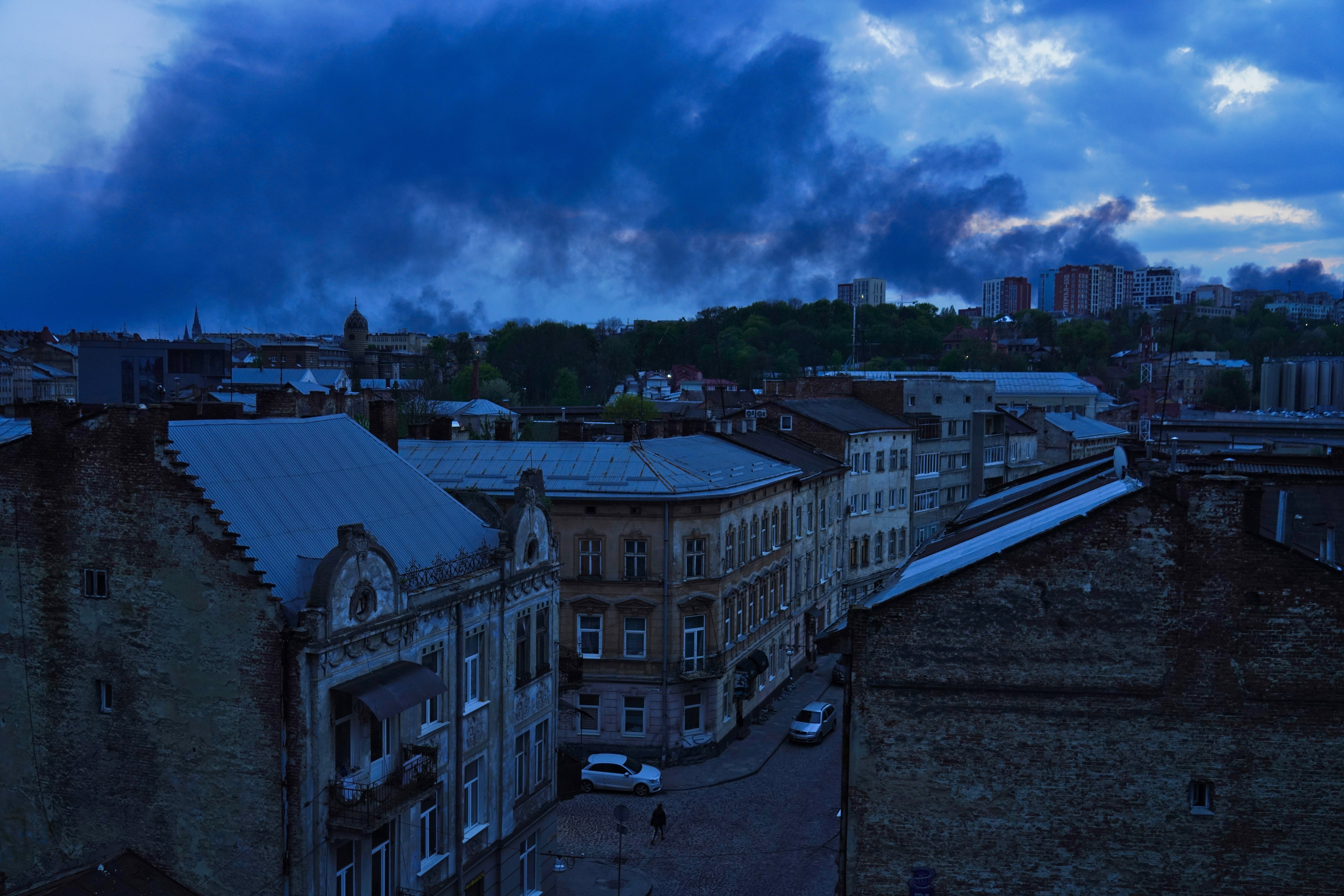ZAPORIZHZHIA, Ukraine -- Russian forces Tuesday began storming the steel mill containing the last pocket of resistance in Mariupol, Ukrainian defenders said, just as scores of civilians evacuated from the bombed-out plant reached relative safety and told of days and nights filled with dread and despair from constant shelling.
Osnat Lubrani, the U.N. humanitarian coordinator for Ukraine, said that thanks to the evacuation effort over the weekend, 101 people -- including women, the elderly, and 17 children, the youngest 6 months old -- were able to emerge from the bunkers under the Azovstal steelworks and "see the daylight after two months."
Evacuees, a few of whom were in tears, made their way from the buses into a tent offering some of the comforts long denied them during their weeks underground, including hot food, diapers and connections to the outside world.
The news for those left behind was more grim. Ukrainian commanders said Russian forces backed by tanks began storming the sprawling plant, which includes a maze of tunnels and bunkers spread out over 4 square miles.
How many Ukrainian fighters were holed up inside was unclear, but the Russians put the number at about 2,000 in recent weeks, and 500 were reported to be wounded. A few hundred civilians also remained there, Ukrainian Deputy Prime Minister Iryna Vereshchuk said.
"We'll do everything that's possible to repel the assault, but we're calling for urgent measures to evacuate the civilians that remain inside the plant and to bring them out safely," Sviatoslav Palamar, deputy commander of Ukraine's Azov Regiment, said on the messaging app Telegram.
He added that throughout the night, the plant was hit with naval artillery fire and airstrikes. Two civilian women were killed and 10 civilians wounded, he said.
Lubrani expressed hope for further evacuations but said none had been worked out.
In his nightly video address, Ukrainian President Volodymyr Zelenskyy said that by storming the steel mill, Russian forces violated agreements for safe evacuations. He said the prior evacuations are "not a victory yet, but it's already a result. I believe there's still a chance to save other people."
OTHER ATTACKS
In other battlefield developments, Russian troops shelled a chemical plant in the eastern city of Avdiivka, killing at least 10 people, Donetsk regional Gov. Pavlo Kyrylenko said.
"The Russians knew exactly where to aim -- the workers just finished their shift and were waiting for a bus at a bus stop to take them home," Kyrylenko wrote in a Telegram post. "Another cynical crime by Russians on our land."
Explosions were also heard in Lviv, in western Ukraine, near the Polish border. The strikes damaged three power substations, knocking out electricity in parts of the city and disrupting the water supply, and wounded two people, the mayor said. Lviv has been a gateway for NATO-supplied weapons and a haven for those fleeing the fighting in the east.
A rocket also struck an infrastructure facility in a mountainous area in Transcarpathia, a region in far western Ukraine that borders Poland, Hungary, Romania and Slovakia, authorities said. There was no immediate word of any casualties.
Russian Defense Ministry spokesman Maj. Gen. Igor Konashenkov said Russian aircraft and artillery hit hundreds of targets in the past day, including troop strongholds, command posts, artillery positions, fuel and ammunition depots and radar equipment.
Ukrainian authorities said the Russians also attacked at least a half-dozen railroad stations around the country.
The assault on the Azovstal steelworks began almost two weeks after Russian President Vladimir Putin ordered his military not to storm the plant to finish off the defenders but to seal it off. The first -- and so far only -- civilians to be evacuated from the plant got out during a brief cease-fire in an operation overseen by the U.N. and the Red Cross.
The arrival of the evacuees was a rare piece of good news in the nearly 10-week conflict that has killed thousands, forced millions to flee the country, laid waste to towns and cities, and shifted the post-Cold War balance of power in Eastern Europe.
"Over the past days, traveling with the evacuees, ... they spoke of the hell they have experienced," Lubrani said.
In addition to the 101 people evacuated from the steelworks, 58 joined the convoy in a town on the outskirts of Mariupol, Lubrani said.
About 30 people who left the plant decided to stay behind in Mariupol to try to find out whether their loved ones were alive, Lubrani said. A total of 127 evacuees arrived in Zaporizhzhia, she said.
Elina Tsybulchenko, 54, rejected Russian allegations that the Ukrainian fighters wouldn't allow civilians to leave the plant. She said the Ukrainian military told civilians that they were free to go but would be risking their lives if they did so.
PENTAGON: WAR FLUID
The U.S. has learned a great deal about Russian military shortfalls and capabilities in the first two months of the war in Ukraine, top Pentagon leaders told Congress. But they warned Tuesday that Moscow is learning from its mistakes as the war shifts to a new phase and that will shape the artillery and other weapons systems the U.S. will provide.
Defense Secretary Lloyd Austin and Gen. Mark Milley, chairman of the Joint Chiefs of Staff, told a Senate Appropriations subcommittee that if Congress approves funding, the most critical things that Ukraine needs are anti-tank, anti-aircraft and shoulder-fired surface-to-air missiles.
With the fighting now concentrated in the eastern Donbas region, Ukrainian forces also need more tanks and other mechanized vehicles, which the U.S. and other nations are providing, Milley added. The coming weeks, they said, will be crucial.
Sen. Patty Murray, D-Wash., was among the lawmakers who pressed Austin and Milley on whether weapons are actually getting out to the troops on the front lines, or if they are being diverted or hoarded.
The defense secretary said it's difficult to know since there are no U.S. personnel on the ground in Ukraine to monitor the weapons flow. But he said they talk to their counterparts in Ukraine regularly, and stress the need for accountability in weapons distribution.
Austin pointed to early failures by Russia, including almost immediate struggles with logistics, and difficulties getting food, water and supplies to troops.
"As we saw things unfold on the ground, we saw them not able to support themselves logistically," Austin said. "I attribute a lot of that to lack of leadership at the lower level."
The leadership problems, he said, forced Russia to send higher ranking generals to the battlefront, where "many" have been killed.
Austin said the U.S. expects to see some of the same mistakes as the fighting in the Donbas and across southern Ukraine escalates, as Russia tries to wrest control of a solid stretch of land from the east, through Mariupol, along the Sea of Azov to Crimea.
But, he said, "they will learn from what they did in the early stages of this fight. And we'll see them improve their logistical efforts. And we'll see them improve their massing of fires and that sort of business. But some things they won't be able to correct."
In a related matter, President Joe Biden has nominated Army Gen. Christopher Cavoli to be the next top general for Europe and serve as the Supreme Allied Commander for NATO. He would replace Air Force Gen. Tod Wolters.
ECHO OF CHURCHILL
British Prime Minister Boris Johnson told Ukrainian lawmakers Tuesday that their defense against Russia's invasion would rank as "Ukraine's finest hour," invoking Winston Churchill's declaration about Britons as they faced the Nazi onslaught at the beginning of World War II.
In the first address by a foreign leader to Ukraine's parliament, Johnson burnished his credentials as a stalwart supporter of Ukraine and a close ally of Zelenskyy.
"You have exploded the myth of Putin's invincibility and you have written one of the most glorious chapters in military history and in the life of your country," Johnson said, referring to President Vladimir Putin of Russia. "The so-called irresistible force of Putin's war machine has broken on the immovable object of Ukrainian patriotism and love of country."
"This is Ukraine's finest hour, that will be remembered and recounted for generations to come," he said in a video address recorded from Downing Street that was broadcast in the parliament's chamber.
Johnson insisted that no peace agreement with Russia should be foisted on the Ukrainians by outsiders. The courage of Ukraine's citizens, he said, had earned the country the right to control its destiny.
Moreover, he added, the West had been slow to grasp the threat posed by Putin when Russia seized Crimea in 2014.
"We collectively failed to impose the sanctions then that we should have put on Vladimir Putin," he said. "We cannot make the same mistake again."
Johnson announced that Britain would provide $375 million in military aid to Ukraine, including electronic warfare gear, a counter-battery radar system and GPS-jamming equipment.
Information for this article was contributed by Cara Anna, Yesica Fisch, Inna Varenytsia, David Keyton, Jon Gambrell, Yuras Karmanau, Mstyslav Chernov, Lolita C. Baldor and staff members of The Associated Press and by Mark Landler of The New York Times.
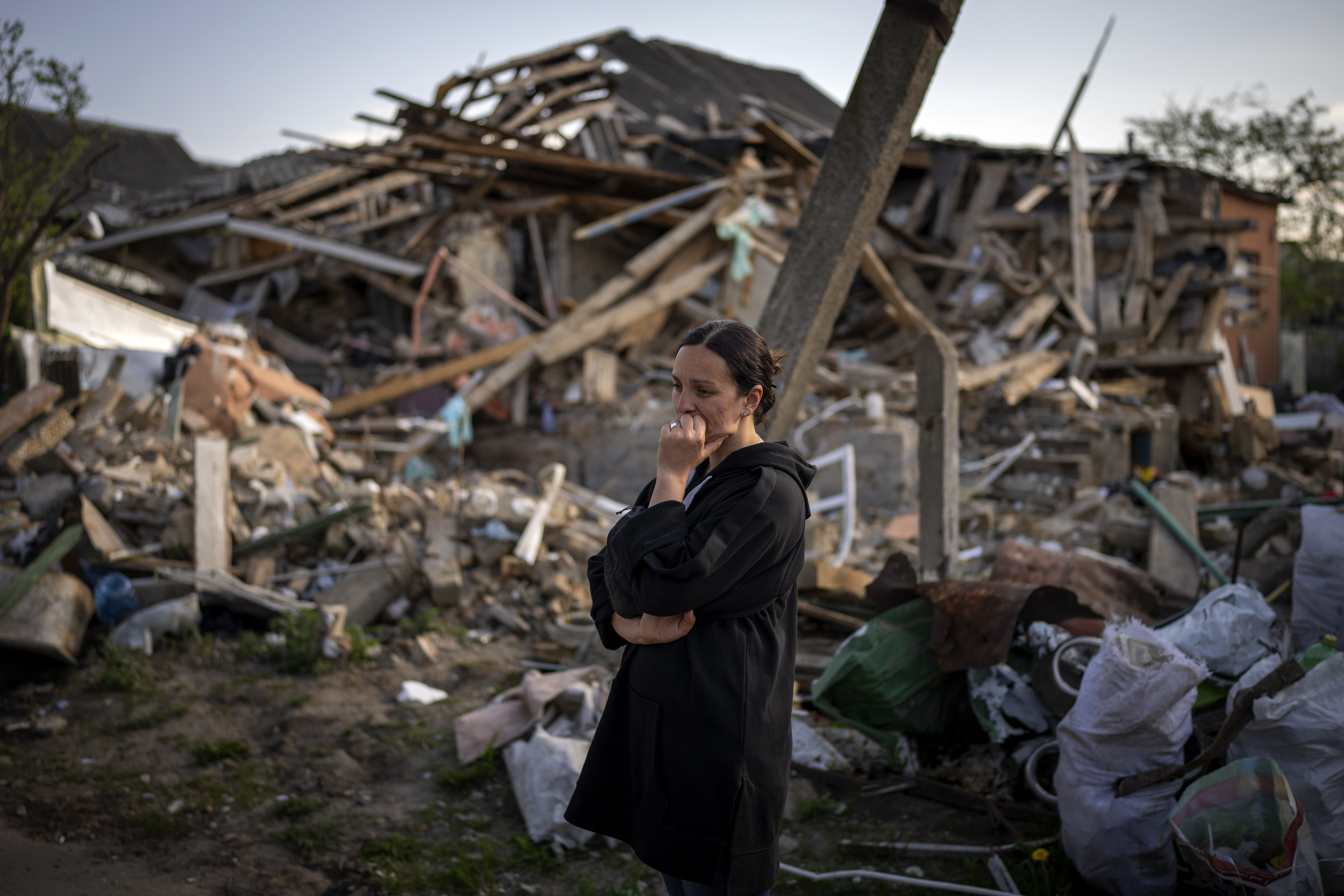 Anna Shevchenko, 35, reacts next to her home in Irpin, near Kyiv, Tuesday, May 3, 2022. The house, built by Shevchenko's grandparents, was nearly completely destroyed by bombing in late March during the Russian invasion of Ukraine. In her beloved flowerbed, some roses, lilies, peonies and daffodils survived. "It is new life. So I tried to save my flowers," she said. (AP Photo/Emilio Morenatti)
Anna Shevchenko, 35, reacts next to her home in Irpin, near Kyiv, Tuesday, May 3, 2022. The house, built by Shevchenko's grandparents, was nearly completely destroyed by bombing in late March during the Russian invasion of Ukraine. In her beloved flowerbed, some roses, lilies, peonies and daffodils survived. "It is new life. So I tried to save my flowers," she said. (AP Photo/Emilio Morenatti)